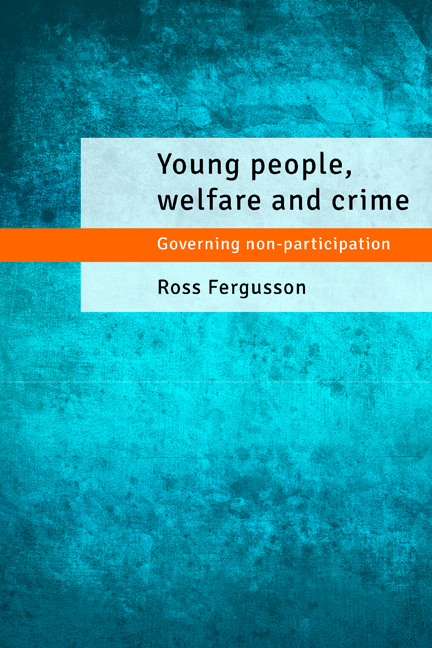Book contents
- Frontmatter
- Dedication
- Contents
- Detailed contents
- List of figures and tables
- List of abbreviations
- About the author
- Acknowledgements
- Part One The crisis of non-participation
- Part Two Work, welfare and crime: research and policy
- Part Three Theorising non-participation
- Part Four Criminalising non-participation
- References
- Copyright material
- Index
Two - Young people and non-participation: discourses, histories, literatures
Published online by Cambridge University Press: 01 September 2022
- Frontmatter
- Dedication
- Contents
- Detailed contents
- List of figures and tables
- List of abbreviations
- About the author
- Acknowledgements
- Part One The crisis of non-participation
- Part Two Work, welfare and crime: research and policy
- Part Three Theorising non-participation
- Part Four Criminalising non-participation
- References
- Copyright material
- Index
Summary
A very considerable number of the boys whose cases have occupied the attention of the Committee, have attributed the course of life, in which they have been engaged, to an association with bad companions … [but] in many instances [the] cause has been want of employment. The moral culture of the boys has been neglected, and often the poverty of their parents has induced them to endeavour to place their children at an occupation rather than send them to school. Until a situation could be procured for a lad under these circumstances, his hours have usually been at his own disposal. The vivacity of youth has impelled him to action: he has had no legitimate object for the attention of his mind. Thus exposed to temptation, the wonder would rationally be, if he did, rather than if he did not, abstain from the suggestions of folly and vice.
The Report of the Committee for Investigating the Causes of the Alarming Increase of Juvenile Delinquency in the Metropolis, London, 1816, columns 16-17
Introduction
Non-participation in education, training, the labour market or other forms of approved productive activity is named and narrated in remarkably diverse ways. In the UK at least, young people who are not participants in recognised activities are variously described as unemployed, truants, disengaged, disconnected, marginalised, socially excluded, or as welfare dependants, dropouts, resistant refusers, victims of failed transitions or members of a new precariat. These terminologies and narrations manifest themselves as social-scientific concepts, administrative categories, historical accounts, policy discourses and scholarly literatures. Charting and analysing the ways in which they are constructed, propagated and afforded status as authoritative descriptors would provide an informative focus for the study and analysis of problematised populations of young people. The more modest aim of this chapter is to examine three principal discourses that purport to explain non-participation – those of transitions, social exclusion and disengagement. The chapter also provides a historical account of some major changes that have radically and apparently irreversibly altered the circumstances in which young people are able – or unable – to achieve social and economic independence as young adults; and of the policy shifts which have initiated, responded to or cemented those changes. It also draws on a range of literatures which variously expound, analyse and critique the changes, discourses and policies with which they are associated.
- Type
- Chapter
- Information
- Young People, Welfare and CrimeGoverning Non-Participation, pp. 29 - 54Publisher: Bristol University PressPrint publication year: 2016



